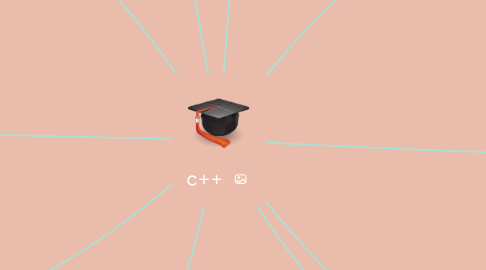c++
Door Mohamed Hamada


1. features
1.1. compiler based
1.2. objected oriented
1.3. simple
1.4. language
1.5. rich library
1.6. pointers
1.7. fast, powerfull
2. program structure
2.1. sequence
2.1.1. cout statement
2.2. loop
2.2.1. do while statement
2.2.2. while statement
2.2.3. for statement
2.3. selection
2.3.1. if statement
2.4. subprogram
2.4.1. main function
2.4.2. cube function
2.4.3. square function
3. data types
3.1. integer
3.2. floating point
3.3. character
3.4. embty
3.5. boolean
3.6. double
4. advantage
4.1. objected - oriented
4.2. portability
4.3. malti-paradigm
5. syntax componentes of the c++ program
5.1. semicolons
5.2. whitespace in c++
5.3. comments
5.4. tokens in c++
5.5. return 0;
5.6. print statement
5.7. open and close tages
5.8. the main function
5.9. namespace
5.10. header files
6. information about c++
6.1. the c++ programming language has a history going back to 1979
6.2. created by bjarne stroustrup
6.3. in 1983, the name of the language was changed from c with classes to c++
6.4. in 1990 the annoted c++ reference manual was released
6.5. in mid 2011 the new c++ standerd was finished
6.6. the current c++20 standerd supersedes these with new feature and enlarged standared library
6.7. in 1985 stroustrupes reference to the language entitled the c++ programming language was puplished
7. appplecation
7.1. desktop app
7.2. devolop games
7.3. design database
7.4. design os
7.5. devolop other language
7.6. medical app
8. operator
8.1. arithmatic
8.2. asseignment
8.3. relational
8.4. logical
8.5. bitwise
8.6. other operation
9. disadvantage
9.1. use of pointers
9.2. absence of garbage
9.3. security issue
10. objected oriented
10.1. classes and objects
10.1.1. c++ class definition
10.1.2. define c++ objects
10.1.3. accessing the data member
10.1.4. classes and objects in detals
10.2. inheritance
10.2.1. base and dervied classes
10.2.2. accesse control and inhertiance
10.2.3. type of inhertiance
10.2.3.1. puplic
10.2.3.2. protected
10.2.3.3. private
10.2.4. multiply inhertiance
10.3. over loading
10.3.1. function overloading in c++
10.3.2. operator overloading in c++
10.4. polymorphism
10.4.1. virtual function
10.4.2. pure virtual function
10.5. data abstaction
10.5.1. access labels enforce abstraction
10.5.2. benefit of data abstraction
10.5.3. designing strategy
